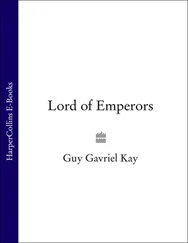Some days later he would learn that the man had not been found. He wasn’t, evidently, a fool. It had proved extremely difficult even to establish his identity. None of them there that morning had asked his name, of course, and there were, Prime Minister Hang was informed, four thousand, six hundred men employed in the emperor’s garden.
Eventually they would determine, through the Genyue supervisors’ records, who he was—a man from the north. Guards sent to his residence would find it empty, with signs of a hasty departure. Well, they knew it had been a hasty departure. The gardener was gone, his wife and a child were gone. None of the neighbours knew where. He hadn’t been a talkative man. Northerners tended not to be.
There was a grown son living in a house outside the walls. He was interrogated. He did not know where his parents and young sister had gone, or so he would maintain right up until he died under questioning.
It was disappointing.
Holding high office (for so many years) meant that you had done, and would have to continue doing, unpleasant things at times. Actions inconsistent with philosophic ideals. It was necessary, at such moments, to remember that one’s duty was to the empire, that weakness in power could undermine peace and order.
Difficult as it was for a virtuous man to have someone killed merely for overhearing a conversation, it was even more difficult to discover that the order, once given, had not been carried out.
He would also give thought to the imperial guards who had been standing by that morning. They were trusted favourites of the emperor, always with him, not men one could order executed. Not without consequences. He had them promoted in rank, instead.
You did what you could.
“Deputy Kai,” the emperor of Kitai had said in his garden that morning, “we are displeased.”
Kai Zhen, standing below him on the brushed path, inclined his head in sorrow. “My lord, I live to amend anything that causes this, any errors your servants have committed. Only tell me!”
Wenzong’s face remained chilly. “We believe it is the deputy prime minister’s errors that have disturbed our morning.”
Even with bad eyesight, Dejin could see Zhen’s eyes flicker towards him, then back to the emperor. Dance a little, he thought. Unworthy malice, perhaps, but he had cause.
He watched as Kai Zhen sank to his knees. Dejin envied him the ease of the movement. The deputy prime minister’s beard and hair were still black, his back was straight. His eyes, undoubtedly, were keen.
Impatiently, Wenzong motioned him upright. Zhen took a careful moment then he did rise, head still lowered, hands folded submissively in sleeves. Dejin wondered if they were shaking. It was possible.
Looking down at the smoothed gravel path (and at the gardener lying on it), Zhen said, “Our fates are in the emperor’s hands, always. It is a grief to me if I have erred in your service.”
“Excess,” said Emperor Wenzong, “can be an error as much as neglect.”
Hang Dejin blinked. It was an elegant phrase. Wenzong could surprise. Although it would not do to dwell upon the emperor’s own neglect of duties. For one thing, that habit had allowed Dejin to control and shape Kitai these many years.
Kai Zhen, smooth as finest silk, murmured, “Zeal in your service may indeed lead me to excessive devotion. I will admit it.”
But Wenzong was in a dark, sharp mood. He shook his head at the sleek evasion. “Why is Court Gentleman Lin Kuo exiled to Lingzhou Isle?”
Dejin could almost feel Zhen’s relief. He now knew what he was facing. A small matter, easy to address.
The deputy prime minister said, “The emperor is so gracious! To offer imperial guidance on minor affairs of state! It humbles his servants!” His voice was rich. He was a handsome man. No one would ever have said either about Hang Dejin, even when he was young.
“We have seen petitions on the court gentleman’s behalf. We would know why our well-known benevolence has been compromised in this matter.”
That placed things in a different light. Zhen could be seen absorbing this. He cleared his throat. “Celestial lord, it must surely be the task of your servants to defend you and the empire. As dangers mount around us and—”
“What danger did Court Gentleman Lin Kuo present, Deputy Kai?”
Yet another interruption. The emperor was in a dangerous mood.
A real hesitation for the first time, as Zhen registered this too. “I … he was allied with the conservatives, of course, my lord. That evil faction intent on destroying all peace!”
“He wrote a book on the gardens of Yenling. He sent it to us last year. We read it and approved of it.”
At this point, thought Hang Dejin, happily silent, his expression composed, Deputy Minister Kai would believe he understood the gravity of the moment.
“My lord, he visited with the exiled Xi Wengao.”
“Years ago! Many visit him. It is not forbidden. He presented him with a copy of his book. Master Xi’s garden is described in it. We ask again, what is it Lin Kuo has done? Really. Lingzhou Isle?”
“The … the banished poet was there that same day! They met with Lu Chen on his way to exile. It was … it was an obvious moment of plotting!”
Time to speak. “Xi Wengao, whose honour we will not impeach, has written to say that the court gentleman had no idea Lu Chen would be present. Xi Wengao writes that he was grieving for his friend, and asked Lin Kuo to attend upon him the same day to brighten his own mood. Lin Kuo brought his young daughter, now married into the imperial clan. She writes the same thing. What plot did you uncover from that day?”
There was nothing so obvious as hatred in the look Zhen gave him, but it could chill you, nonetheless, if you weren’t his superior, still, and used to such glances over the years. And they hadn’t yet reached the heart of this morning. He knew that; Zhen did not.
Kai Zhen said, “Xi Wengao, all his life, has been loyal to his friends and followers.”
“A trait,” said the emperor, “we admire.” He paused. “We choose to give instruction in this matter. The order of exile for Lin Kuo will be rescinded and notice conveyed to him immediately. He is to be raised two ranks in the civil service by way of redress and given the proper adjustments in salary and housing. His daughter and her husband will attend upon us in our garden. We wish to meet this woman. Her calligraphy is exceptional. From today, all names proposed and punishments decreed for those remaining in the conservative faction are to be reviewed by the prime minister. We are displeased, deputy councillor.”
Naturally Kai Zhen went straight to his knees again. Quite close to the gardener, in fact. He pressed his forehead to the gravel of the path.
“My life is yours, celestial lord!” he cried.
“We know this,” said Wenzong.
He could be impressive, Dejin thought, when moved to engage with his power. It rarely happened. You could sometimes regret that.
The emperor said, “Remain as you are, and advise us where General Wu Tong is, your chosen commander in the northwest. Explain why he has not been brought to court to tell us what happened in the Kislik war. We have learned this morning, for the first time, from a gardener , what the whole of Hanjin seems to know!”
He did not trouble (he was the emperor) to hide his anger.
And here, of course, was the true and deadly menace of the morning. Kai Zhen would be realizing it, Dejin thought. His heart would be hammering, sweat would be on his body, his bowels would probably be clenching and releasing with fear.
He would be aware that he could lose all power and rank, could even die today. Or be exiled to Lingzhou Isle.
Читать дальше












